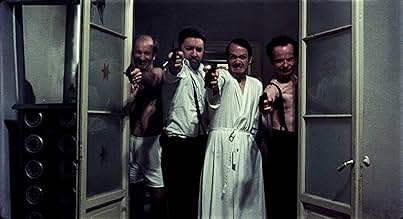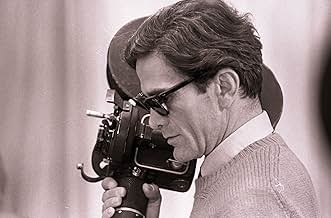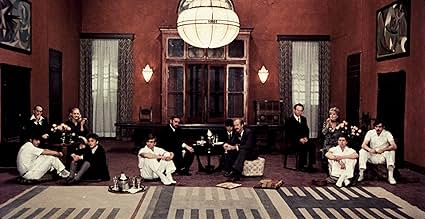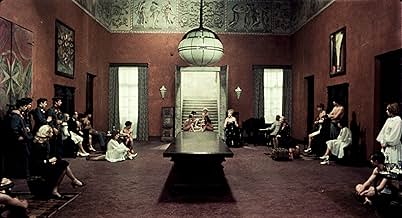
En Italie, au cours de la Seconde Guerre mondiale, quatre libertins fascistes rassemblent neuf jeunes hommes et jeunes filles et les soumettent à cent vingt jours de torture physique, mental... Tout lireEn Italie, au cours de la Seconde Guerre mondiale, quatre libertins fascistes rassemblent neuf jeunes hommes et jeunes filles et les soumettent à cent vingt jours de torture physique, mentale et sexuelle.En Italie, au cours de la Seconde Guerre mondiale, quatre libertins fascistes rassemblent neuf jeunes hommes et jeunes filles et les soumettent à cent vingt jours de torture physique, mentale et sexuelle.
- Réalisation
- Scénario
- Casting principal
- Récompenses
- 2 victoires au total
- Eccellenza
- (as Umberto P. Quintavalle)
- Signora Vaccari
- (as Helene Surgere)
Résumé
Avis à la une
*** 1/2 (out of 4)
Nine young boys and nine young girls are gathered up and taken from their homes. They are taken to a secluded castle in Italy during WWII where they hear a variety of perverted stories while their captures sexually and mentally abuse them.
Pier Paolo Pasolini would be murdered before the release of this, his final film and many still seem to think it wasn't a random murder. Many people believe that his politics had some higher ups order his murder but it's doubtful we'll ever know what the truth was. With that said, this final film of his is certainly unlike anything you're ever going to see as it's about as depraved, disgusting and depressing as you're going to get. I personally think SALO, OR THE 120 DAYS OF SODOM is a very good movie but it's hard to really recommend it to anyone.
Based on the work of Marquis de Sade, this film is about as disturbing as everything put to film. The real debate is rather this is some sort of serious art film with a message or is it just a cheap piece of exploitation that was meant to make you sick. I mean, certain horror movies are trashed for their disgusting scenes of violence and sexual brutality but how many movies are actually worse than this one? Not only do you get disgusting stories being told ranging from child rape to people being forced to eat poop but we have to see these things as well. This is a film that really works on the viewers mind so it's going to be up to that viewer whether they take it in as art or some sort of exploitation.
For my money, the film is a piece of art. I'm not going to say what the director was trying to do or say with the picture but to me this film works because it seems very real. It seems like you're really there watching these horrible events and the film really doesn't back down at anything. The stories are rather brutal and we get scenes of such sexual depravity that you can't help but be disturbed. There really isn't any style here because the camera just captures the horrors that are there. The performances are raw, realistic and just add to the horrors of the story.
Obviously, not everyone is going to be able to take this film and I really can't say I'd blame anyone for turning it off. Again, we can debate the politics and message of the film but there's no question that when the end credits start you're going to need a shower.
The film is about a group of rich Fascists during WWII-Nazi Occupied Italy, where they kidnap a group of 18 youngsters, allowing only physically perfect specimins to stay, and subject them to various forms of mental, physical and sexual torture over the next 120 Days. The torture starts off in a sexual nature--Sodomy, rape, humiliation and so on-- and slowly degrades and descends into mental and physical torture. Just when you think what you are seeing can't get worse, it does, ten-fold.
What makes Salo so brutally shocking and disturbing is its uncompromised and blunt way of showing the acts of horror. It is a very quiet and slow film, mostly shot using static and still cameras, it feels more like a documentary than a fictional film. It's clear upon viewing, that Pasolini wanted to remind us all that violence should not be entertainment. As such, every act of violence and degredation is drained of all its possible energy and excitement, and shown in a sad, painful light. Nothing is sugar coated, nothing is softened. This film is an attack on our desensitized feelings towards violence. Yet, at the same time, the film purposely desensitizes us to certain acts -- Such as rape. We see it so much during the film that it becomes "normality" to us, we barely raise an eyebrow. Upon realizing this, one also realizes how the horrible acts shown in the film are possible, and it's a terrible realization.
Salo continues to descend until at the end, when we are taken to the punishing grounds, where various rule breakers are tortured and murdered. This final sequence is the most harrowing and effective I've ever seen in a film. As the victims are tortured and murdered, each one of the fascist rulers take turns as voyer, watching from a second story window, far enough away to not hear the screams of terror and pain. And we watch with him. The film attempts to equate our viewing of this film to their viewing of the executions, after all, we're watching these acts for "entertainment", just as he is. And we distance ourselves from the acts in order to enjoy them, as he does by watching through binoculars far away. It's a savage and truthful attack, one that is impossible to deny.
Also incredibly unsettling is the inherent joy that the villains (Heroes?) feel at their victims pain, sadness and discomfort. Sometimes even to the point of sexual arousal. There is a scene where a girl is crying because her mother died trying to save her from these people. She is completely naked as she weeps, to us, she's the picture of vulnerability and sadness, to the fascists, it's the most exciting thing they've seen all day. The fascists all stand and watch her weep with the utmost sexualexcitement. It is terrifying. It's scenes like these that set Salo apart from other "gross out" movies. Some of the most affecting and frightening scenes are ones where there is quiet, watching the expressions and reactions of people to the various horrible acts.
Salo is a film of rage and sadness. It is a film that asks you to hate humanity, to hate what we're capable of; to look in the mirror and hate yourself. Then weep because nothing can be done about it. Nothing will ever change..
Le saviez-vous
- AnecdotesDespite the grim subject throughout the film, in an interview on the second disc of the Criterion Collection box set, actress Hélène Surgère claimed the mood was actually rather jovial on the set and that none of the teenage actors were actually harmed or traumatized. She said the abundance of teenagers who had never acted before led the mood to be happy and at times, even fun, with the cast often playing practical jokes on each other. She also said that the movie was literally "made" in the editing room and the filmmakers had no idea how grim a movie it was until they saw the finished product at the premiere.
- GaffesWhen the Duke kisses several victims during Sergio and Renata's wedding, some victims and Ezio begin to laugh, off the character.
- Citations
The President: [while eating a meal of feces] Carlo, do this with your fingers.
[the President sticks two fingers in his mouth]
The President: And say, "I can't eat rice with my fingers like this."
Male Victim: [with fingers in his mouth] I can't eat rice.
The President: Then eat shit, you little bastard.
- Crédits fousEssential Bibliography: Roland Barthes: 'Sade, Fourier, Loyola' (Editions du Seuil); Maurice Blanchot: "Lautréamont et Sade' (Editions de Minuit; in Italy Dedalo Libri); Simone de Beauvoir: 'Faut-il brûler Sade' (Editions Gaimard); Pierre Klossowski: 'Sade mon prochain, le philosophe scélérat' (Editions du Seuil; in Italy SugarCo Edizioni); Philippe Sollers: 'L'écriture et l'experience des limites' (Editions du Seuil)
- Versions alternativesThe film was rejected for cinema by the BBFC in 1976 and a private showing of the uncut version at the Old Compton Cinema Club in London's Soho resulted in a police raid and confiscation of the movie. A heavily edited version - minus 6 minutes of footage including scenes of torture, homosexuality and excrement eating, and including a 4 minute prologue describing the history of the town of Salo - was later prepared by UK censor James Ferman for club showings. The film was finally passed completely uncut for cinema and video in the UK in December 2000.
- ConnexionsEdited into Histoire(s) du cinéma: Une histoire seule (1989)
- Bandes originalesPrelude in C minor
(uncredited)
Composed by Frédéric Chopin (uncredited)
Played by Arnaldo Graziosi (uncredited)
Meilleurs choix
Détails
- Date de sortie
- Pays d’origine
- Langues
- Aussi connu sous le nom de
- Saló o los 120 días de Sodoma
- Lieux de tournage
- Sociétés de production
- Voir plus de crédits d'entreprise sur IMDbPro
Box-office
- Montant brut mondial
- 1 808 595 $US
- Durée1 heure 57 minutes
- Mixage
- Rapport de forme
- 1.85 : 1
Contribuer à cette page


![Trailer [OV]](https://m.media-amazon.com/images/M/MV5BYTczYWExODUtNmQ3NC00MzRhLTkwMGQtNzRjM2M5ZGQzYmVkXkEyXkFqcGdeQXRyYW5zY29kZS13b3JrZmxvdw@@._V1_QL75_UX500_CR0)

























